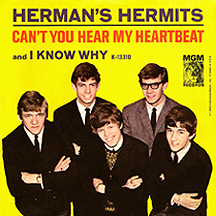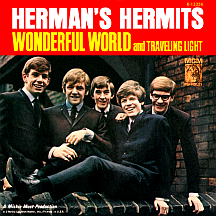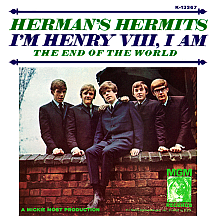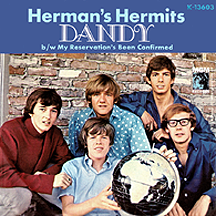HERMAN'S HERMITS
Peter Blair Denis Bernard Noone got his start in show business in 1961, at the age of 13, when some casting agents showed up at his primary school in Manchester, England in search of children for a TV show. He was selected and shortly thereafter cast in a new series, Coronation Street, a wildly popular twice-weekly soap that is still running more than 50 years later. It was a brief stint, which was fine with young Noone. Acting, it seems, wasn't his main goal; he wanted to be a singer in the mold of his idols Buddy Holly, The Everly Brothers, Roy Orbison and then-hot Brit heartthrob Adam Faith.
His first attempt with a band called The Cyclones is best left obscured by hearsay. By 1963 he had hooked up with The Heartbeats, a promising group of "mature" kids (he was 15, they were all one or two years older) who, unlike the earlier group, could actually play their instruments. Enamored of all things emanating from the U.S., they made a strange name change based on a character from the animated Rocky and Bullwinkle TV series; glib dog Peabody had a young bespectacled sidekick named Sherman who, it seems, resembled Peter. Shortening the name to Herman, and with some brainstorming among band members, it was decided the corny but unusual Herman and his Hermits would be their new name.
After a few shifts in personnel, the group's lineup was set with singer Noone, guitarists Derek Leckenby (sporting Buddy Holly horn-rims) and Keith Hopwood, bassist Karl Green and drummer Barry Whitwam. Producer Mickie Most caught their act and in 1964 they became one of a few Manchester acts, along with The Hollies, Georgie Fame and his Blue Flames, Freddie and the Dreamers and Wayne Fontana and the Mindbenders, to acquire a recording contract. They turned out to be the most popular of the bunch over the next few years. Shortening the name to the more economical, roll-off-the-tongue Herman's Hermits, things happened fast. By the end of the year their first single landed at number one.
The guys, particularly Hopwood and Leckenby (preferred nickname: "Lek"), were serious about songwriting, and many original compositions were recorded by the band over the years, yet their single releases, as dictated by producer Most and the heads of EMI's Columbia label, came from outside sources. The Gerry Goffin-Carole King song "I'm Into Somethin' Good," a U.S. hit for Cookies lead singer Earl-Jean in August '64, remade with the slightly-altered title "I'm Into Something Good," blasted to the top of the British charts the following month. Sliding across the pond, it spent November and December in the U.S. top 20 while another Goffin-King tune, follow-up "Show Me Girl," went top 20 back home (but never came out in America).
Columbia Records in the U.K. and MGM, the Hermits' American label, differed in their approach to marketing the band; MGM positioned Peter as a preteen heartthrob while Columbia targeted slightly older fans in a concerted effort to compete with the likes of The Beatles and The Dave Clark Five. Both strategies worked. "Can't You Hear My Heartbeat" peaked at number two and launched a nonstop six month stretch in the top ten for the group; released only in the States, a version by American female band Goldie and the Gingerbreads (as "Can't You Hear My Heart Beat?") was a hit in England.
Nine consecutive Hermits releases made the top ten in America over the next year and a half; Frank Slay and Bob Crewe's "Silhouettes" (a smash for The Rays in 1957) came next, simultaneously landing in the top ten with "Mrs. Brown You've Got a Lovely Daughter," a fluke hit not originally intended for release as a single. In Britain it wasn't, but in America this melancholy breakup song rose quickly to number one, becoming their all time biggest seller. A banjo-driven ditty thrown together on a whim, it was written by British actor Trevor Peacock and performed by future Oscar-nominated actor Tom Courtenay in the 1963 TV presentation The Lads. No one anticipated its success except, perhaps, the A&R department at MGM Records.
The Hermits recorded as a self-contained band on many sessions, yet studio musicians were often brought in to take up the slack or compensate on more musically sophisticated numbers; Jimmy Page, future star of The Yardbirds, and his latter-day Led Zeppelin bandmate John Paul Jones, performed on a number of the group's recordings. Singles were released at six- to eight-week intervals in 1965, a tight schedule that might typically cause some songs to be overlooked, but Herman's Hermits hit with every one, at one point enjoying three simultaneous top 20 hits (a seldom-seen feat previously accomplished by Elvis Presley and the Beatles, in addition to Sonny and Cher later the same year).
A hit remake of Sam Cooke's classic "Wonderful World" (composed by Cooke with Lou Adler and Herb Alpert) came next, followed by another U.S.-only single, "I'm Henry VIII, I Am," a cockney singalong song written by Fred Murray and R.P. Weston and made famous in 1910 by Harry Champion (the original title spelling the name "Henery" as it's pronounced in the song). Against odds, it knocked The Rolling Stones' "(I Can't Get No) Satisfaction" off the top spot in August, becoming the second number one Hermits hit declined release in the band's native land. Come Grammy time, Noone and the boys picked up two nominations for "Mrs. Brown," a trick even the Stones, with the year's biggest hit, couldn't pull off. After Kenny Young's catchy "Just a Little Bit Better" became the group's sixth '65 top ten hit, the streak continued into '66 with the clever P.F. Sloan-Steve Barri puzzler "A Must to Avoid," Graham Gouldman's effectively restrained "Listen People" and "Leaning on the Lamp Post," another traditional British oldie, this one written by Noel Gay and performed by George Formby in the 1937 film Feather Your Nest.
While Peter, Keith and Lek labored to create their own songs, Mickie Most and the record company execs chose from a wide variety of music old and new, achieving diversity among the songs that became hits. "This Door Swings Both Ways" originated from the pens of American songwriters Estelle Levitt and Don Thomas; "Dandy" from the overactive imagination of The Kinks' Ray Davies. The group had become a teen sensation approaching the magnitude of the Beatles themselves (they actually had more top ten hits in '65 than the Fab Four); a big screen cash-in (for the MGM studio and record company, anyway) was inevitable. They costarred with Shelley Fabares in Hold On!, which hit theaters in the summer of '66 to less-than-stellar reviews, its space capsule shenanigans only of interest today as a sort of mid-'60s time capsule.
Gouldman contributed two more Hermits hits, "No Milk Today," top ten in Britain in the fall of 1966, and "East West," a hit in both countries at the end of the year. The former ended up as the flip side of the of a song written by Geoff Stevens and "It's Not Unusual" writer Les Reed, "There's a Kind of Hush (All Over the World)" (recorded by The New Vaudeville Band a few months earlier). Both sides were big in the spring of '67, with "Kind of Hush" the band's eleventh and final U.S. top ten. Three more singles reached the top 40 (Young's "Don't Go Out Into the Rain (You're Going to Melt)," a Donovan song, "Museum," and Brit songsmith Rick Jones' only big hit, "I Can Take or Leave Your Loving"), after which Herman's Hermits inexplicably fell from favor.
A second cinematic effort released in early '68, Mrs. Brown You've Got a Lovely Daughter, had nothing to do with the three-year-old hit song (it centered around a racing dog) and fell about as flat as the earlier film. In America their popularity abruptly ended; they were dropped by MGM Records in the spring of '69. Put simply, their time had passed as a hitmaking act in the U.S., though the reasons why are ripe for debate. The group soldiered on back at home, business as usual, notching four more top ten hits between 1968 and '70.
Peter left the band in 1971 and made the U.K. charts just once as a solo singer with "Oh You Pretty Thing" that spring. Keith Hopwood left for good at about the same time. Staying with the Herman's Hermits brand name, the group retained Peter Cowap (who'd previously written songs for them) as lead singer. One reunion between Noone and the three remaining original members occurred in 1973, resulting in a major tour of Europe and the States. He quit again and the band became The Hermits, making records for several years but failing to recapture any of the magic still evident at the time of the '73 tour. Peter Noone has persisted through the years as a singer, songwriter and always-compelling media personality.
NOTABLE SINGLES:
- I'm Into Something Good - 1964
- Show Me Girl - 1964
- Can't You Hear My Heartbeat - 1965
- Silhouettes - 1965
- Mrs. Brown You've Got a Lovely Daughter - 1965
- Wonderful World - 1965
- I'm Henry VII, I Am - 1965
- Just a Little Bit Better - 1965
- A Must to Avoid - 1966
- Listen People - 1966
- You Won't Be Leaving - 1966
- Leaning on the Lamp Post /
Hold On! - 1966 - This Door Swings Both Ways - 1966
- Dandy - 1966
- East West - 1966
- There's a Kind of Hush (All Over the World) /
No Milk Today - 1967 - Don't Go Out Into the Rain (You're Going to Melt) - 1967
- Museum - 1967
- I Can Take or Leave Your Loving - 1968
- Sleepy Joe - 1968
- Sunshine Girl - 1968
- The Most Beautiful Thing in My Life - 1968
- Something's Happening - 1969
- My Sentimental Friend - 1969
- Here Comes the Star - 1969
- Years May Come, Years May Go - 1970
- Bet Yer Life I Do - 1970
- Lady Barbara - 1970
as Peter Noone and Herman's Hermits - Oh You Pretty Thing - 1970
by Peter Noone






